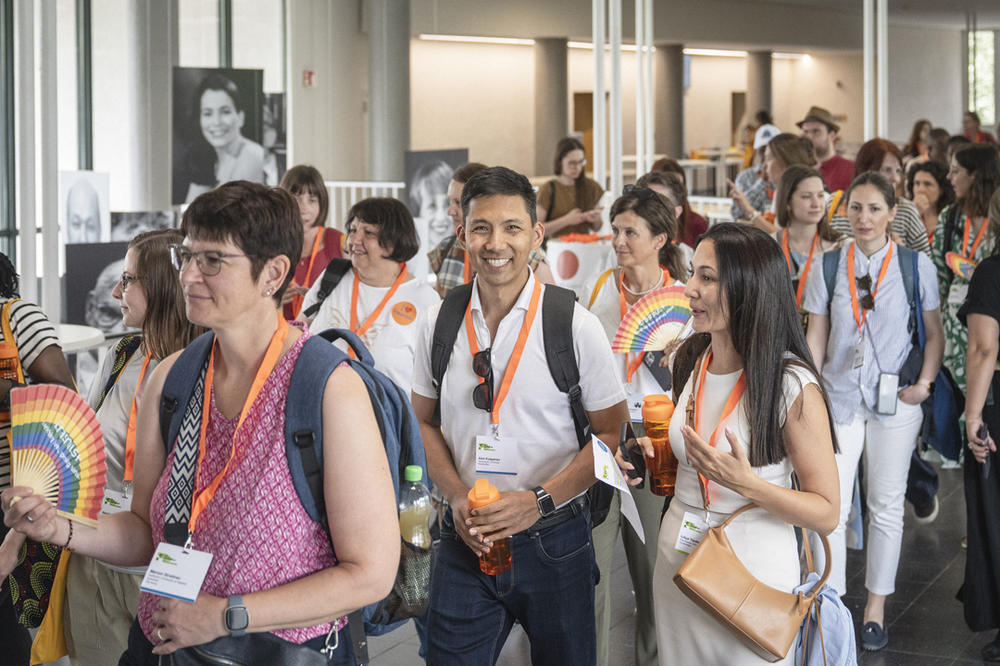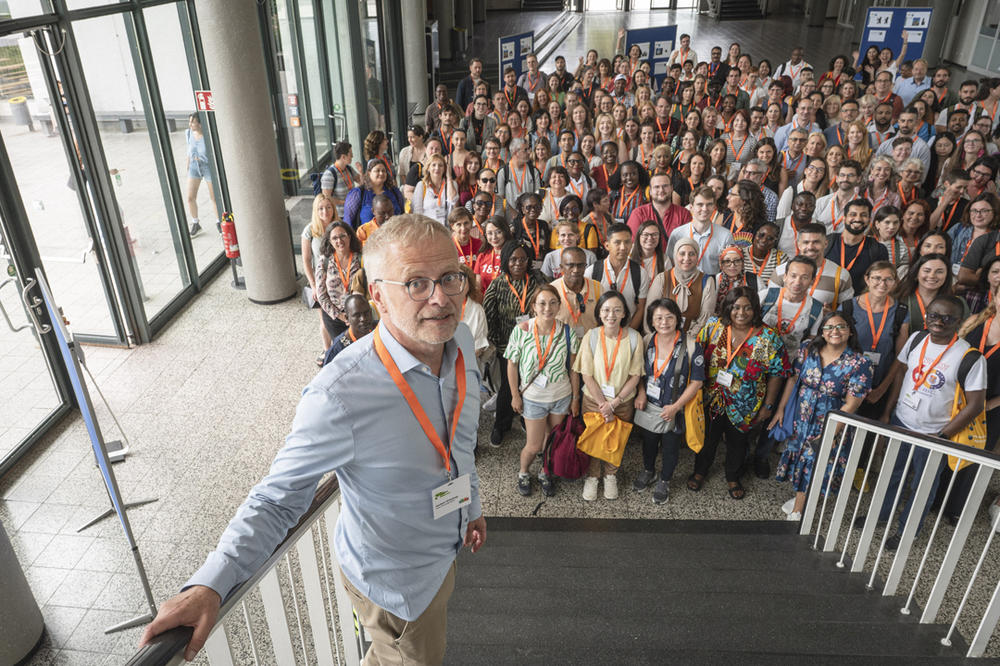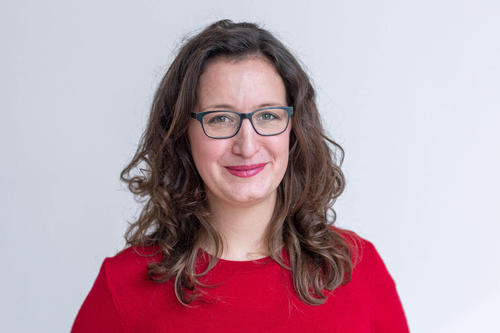“Our Strategy as an International Network University Is Very Much Paying Off”
How Freie Universität Berlin succeeded in securing almost two million euros in funding to support its Erasmus+ partnerships outside of Europe. An interview with Herbert Grieshop and Stefanie Ritter from the Division of International Affairs.
Aug 21, 2025
The thirteenth International Staff Training Week took place at Freie Universität Berlin this June…
Image Credit: Bernd Wannenmacher
The recently acquired funding will go to grants that directly support students and staff who want to travel to one of the university’s eighty partner universities, located across thirty-nine countries. In the following interview Stefanie Ritter, coordinator of the Erasmus+ International Credit Mobility (ICM) program, and Herbert Grieshop, director of the Division of International Affairs discuss how they achieved this major windfall and its importance for the future of international partnerships at Freie Universität Berlin.
Ms. Ritter, Mr. Grieshop, what will this funding mean for Freie Universität Berlin?
Herbert Grieshop: It is truly a badge of honor for our university. To our knowledge, we are the first university to have acquired this funding amount for this particular program. It goes to show that our strategy as an international university committed to forging partnerships around the world and maintaining strong networks is working, and that our experience and expertise tangibly contribute to our success.
…with 175 visitors from 53 countries. Front and center: Herbert Grieshop, director of the Division of International Affairs at Freie Universität Berlin.
Image Credit: Bernd Wannenmacher
We were able to procure about 5.5 million euros in total just for our Erasmus mobility programs this year. This will allow us to expand our international network even more. Outside of Europe we now have eighty partner universities in over forty countries and ten regions.
Stefanie Ritter: Roughly ninety percent of these funds will go directly to grants for stays abroad. Students at Freie Universität Berlin have an incredible range of opportunities to study or do an internship abroad in almost every region of the world. I should mention though that the majority of this money will be designated for incoming students visiting from countries in the Global South.
Stefanie Ritter is responsible for coordinating the Erasmus+ ICM and Staff Mobility program.
Image Credit: Bernd Wannenmacher
University employees are also welcome to take part in the Erasmus+ program, whether they work in teaching or administration. For example, they can decide to job shadow for a week at a partner university.
Thanks to this funding we are not only able to financially support our own students and employees, but also those at our partner institutions around the globe. Erasmus exchanges like this quite often lay the groundwork for new collaborative projects. The Erasmus+ program is a catalyst for cooperation across the world.
Current Opportunities for Teaching Exchanges and Staff Training AbroadIn addition to the mobility of students and administrative staff, the Erasmus+ program with partner countries of the European Commission also offers instructors at Freie Universität Berlin the opportunity to spend time abroad at selected partner universities. Under the Erasmus+ Staff Mobility program, staff can apply to participate in workshops and special training programs at selected partner universities worldwide.
How did you succeed in acquiring this much funding?
Grieshop: A couple of factors came into play. We have decades of experience in international partnerships and are confident in our abilities. And of course we had to keep our noses to the grindstone. Many of our colleagues put a lot of work into writing applications at the start of the year. Our own expertise in different regions of the world as well as that of various departments – not to mention the experience of our liaison offices – all came to bear in these applications.
It is also important to remember that our departments at Freie Universität Berlin are not siloed. Our strength lies in our coordination skills. We are committed to sharing best practices and strive to send off the best possible applications. As you can see, this approach has really paid off.
Ritter: I think it is also important to note that promoting an international outlook and developing global partnerships are not just the preserve of the Division of International Affairs at Freie Universität Berlin. It is quite clear that this strategy is a joint effort pursued across all levels – by different institutes and professors – and that there is widespread support for these endeavors from our colleagues.
The Berlin Senate is currently planning huge budget cuts for universities. Is it possible that these will also jeopardize international programs at Freie Universität Berlin?
Grieshop: We are in a bit of a different situation to many other departments, as our funding only stems in part from the State of Berlin’s budget. Most of our money comes from external funding, as is the case with the Erasmus+ funds. In this sense we are in a comfortable position and are in good financial shape.
But that doesn’t mean that we are totally immune to all of the budget cuts. Applying for and managing external funding always involves having to submit a lot of paperwork and navigate many bureaucratic obstacles.
Ritter: Exactly. It would be something of a Pyrrhic victory if we were able to acquire greater sums of money while also having fewer employees to carry out the work that comes with that.
How has Freie Universität Berlin’s international network developed in recent years?
Grieshop: We have made major progress in building partnerships across Africa. Freie Universität Berlin has been very well represented in North Africa for several years now, thanks in part to our liaison office in Cairo. But we were underrepresented in Sub-Saharan Africa, and that is why we made a conscious effort to change that.
Ritter: We always had professors here and there who would initiate cooperation or projects with universities in the region, but we didn’t have partnerships on a university-wide scale. For a long time we only had one Erasmus partnership south of the Sahara and that was between the Department of Veterinary Medicine and the University of Namibia in Windhoek. Now we have established partnerships in other countries in this region, such as Ghana, Benin, Gabon, South Africa, Botswana, Kenya, and Tanzania.
Do you have any partnerships that are completely new?
Ritter: Yes, we have new partner universities in places like Morocco and Kosovo. We are very excited to see how this develops into the future. As I was saying earlier, more extensive partnerships often emerge from initial Erasmus contacts. This new funding is also a means for us to sound out these kinds of partnerships.
How do you apply to participate in the program?
Ritter: Calls for applications will be posted in the fall. The chances that you will be approved for an exchange – especially if you are an employee – are fairly high. We are always happy to receive applications! The places for students are made available and allocated via a different process, namely our direct exchange programs.
Dennis Yücel conducted the interview.
The original German version of this article appeared in campus.leben, the online magazine published by Freie Universität Berlin.



